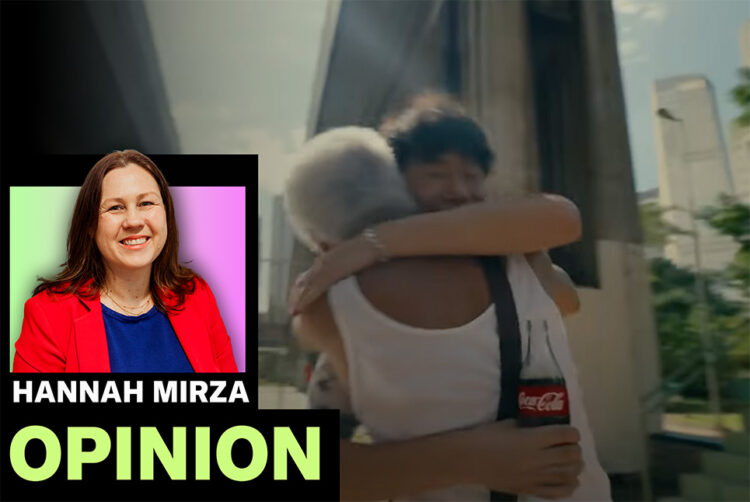Think differently: Sponsorship needs sustainable innovation

Opinion
When brands spend big on sponsorship, the sums involved can make them cautious. But they should use this opportunity to challenge their current business models, Hannah Mirza explains.
Were you inspired by any of the big global sponsorships at this year’s Olympics and Paralympics? While the Samsung “medal selfie” was a great example of product placement, as is common with most global sporting events, I’d say there were missed opportunities by sponsors to stand out and inspire us as marketers.
Part of the problem is that advertisers spend so much on sponsorship packages for big events that they are frightened to make the most of them from a marketing perspective. Communications become too cautious, too corporate and too “all things to all people”.
It’s time for a new model. I think sponsorship should be utilised as a gateway to innovation — a chance to test and learn what a better future might look like and how it could work from a business perspective.
Test and learn
Big sponsorships could be a chance to showcase what changes can be made to products and see whether consumers like it. It’s a chance to test the operational challenges, as well as different communications opportunities around new business models or offers, particularly around sustainability.
Yes, you must do this under the pressure of global scrutiny, but these are perfect Petri dishes for experimentation. There’s money to invest, media budgets to activate and consumers who are open to new experiences in the excitement of the big event coming to their city and country.
Take CES, for instance, where big tech brands and startups come together to give us a vision of the future. While not all of it is yet in our hands or our homes, much of the new technology that we now use every day started life in a booth in Las Vegas.
Big sporting events should be a chance to showcase similar innovation.
Most sustainable Olympics yet
The good news is that we did see a glimmer of hope at Paris 2024, with some brands testing out new services that delivered for consumers and showed a more forward-thinking side of these businesses.
Paris has been billed as the world’s most sustainable Olympics, with half the CO2 emissions than London and Rio, mainly through the use of existing facilities.
Other initiatives include connecting venues with 415km of cycle paths and serving twice as much plant-based food compared with previous tournaments.
There’s still a huge CO2 plume above Paris, including from the synthetic materials used in performance-focused athlete kit, but it’s significantly lower than it might have been.
Coke’s refill pledge
When it comes to sponsors trying to build on that initiative, Coca-Cola promised to provide alternative packaging options in an effort to minimise waste and reduce carbon emissions.
While plastic bottles were still being sold, the brand also installed beverage and water fountains with refill options and sold returnable glass bottles and bottles made with recyclable materials.
Cynics might say that Coke did this under pressure after competitors publicly called out the company. But, to its credit, it responded and will hopefully have learned more about what it might take to roll out similar initiatives in other cities on a permanent basis.
There were certainly some well-reported hiccups, however, with Coke admitting that it was a challenge to adapt to each location, given technical and logistical constraints including water use, electricity supply and storage space.
But if we don’t try, we’ll never learn how to get this right.
Rethinking the established
Another big sponsor, Airbnb, used sponsorship of the Games to showcase how it can make its holiday-booking service more accessible by empowering visitors to select a property that has no steps — critical for those with limited mobility or in wheelchairs.
Re-uz, the official supporter providing reusable and responsible food cups and containers, set up a deposit system to return cups and containers.
We all know that building sustainable business models can be hard. They involve rethinking much that is established and understood, almost by osmosis.
But big event sponsorships introduce a new element to every business and allow people space and time to consider everything differently.
Music lessons
Coldplay and Massive Attack have reimagined what music tours and festivals can look like from a sustainability perspective and there’s no reason why sports sponsors can’t do the same.
The Olympics are also an opportunity for consumers to think differently. To tune in to new voices and campaigns that highlight the fact that sustainability affects every aspect of our lives.
A brilliant example of this is the WWF, which has used traditional sporting language to present the powerful message that the “world records” we want to see broken shouldn’t relate to maximum temperatures, nature loss and melting ice.
The organisation has done this by placing videos of climate records being broken — such as “2023: the hottest year on record” — with articles about Olympians breaking world records.
That campaign alone should be a reminder that the future is coming at us fast. We need to take action as individuals, as brands and as sponsors to reimagine what the future could look like.
 Hannah Mirza is founder and CEO of Responsible Marketing Agency
Hannah Mirza is founder and CEO of Responsible Marketing Agency




